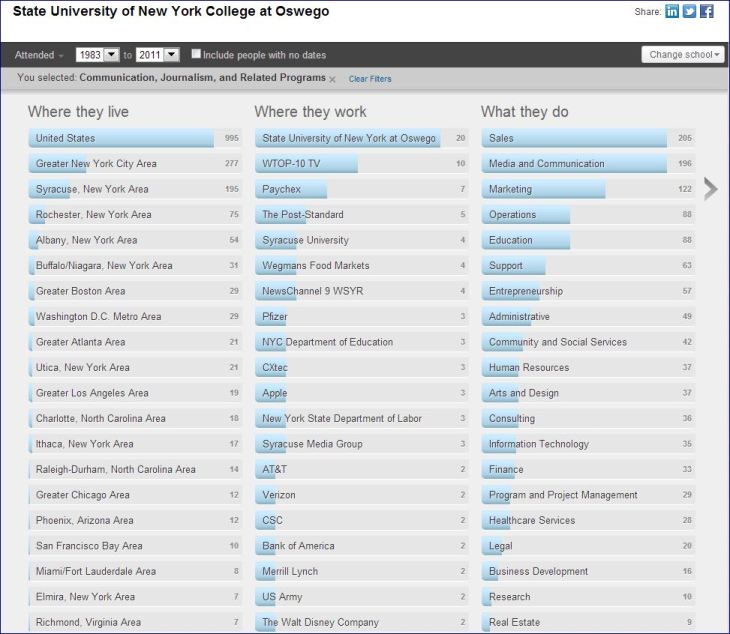 I get a lot of “Ask the Coach” questions asking essentially the same thing:
I get a lot of “Ask the Coach” questions asking essentially the same thing:
What can I do with my major?
This can be very easy or very difficult to answer, depending upon your major.
If you are majoring in accounting, chemical engineering, social work, architecture, or any other field that tracks directly toward a specific professional, you have at least one possible answer to that question.
If you are majoring in a foreign language, any of the liberal arts, or many of the natural sciences and social sciences, you have a wide variety of possible answers.
If you in your senior year and have just discovered that you do not want to work in the area of your undergraduate major, you have a lot of options to consider, and you are probably a bit frustrated and scared.
What should you do? Here are a few things to consider.
Many people with college degrees work in fields NOT directly related to there undergraduate major
Not working in a field related to your major is NORMAL. It certainly is easier to look for work when you are an accounting major looking for a job in accounting, but that doesn’t make it better. Take a look at the new Education section on LinkedIn. (If you’re looking for work and your are not on LinkedIn . . . what are you waiting for?) Search your school’s alumni by major and you will see that you have a lot of options. For example, I went to the State University of New York at Oswego and studied communication. Look at the “Where they work” and “What they do” columns below.
Surprised by the variety? You shouldn’t be. If you limit your search to those opportunities that are directly related to your major, you are really limiting your options.
You major does not define you
You are not an English major, you are a student who happens to be studying English.
You might call it semantics. I call it a big distinction.
Defining yourself by your major is self-defeating. It says “I can only do things that people similarly educated do.” It tells potential employers that the only thing they need to know about you to consider you for a job is your major; nothing else matters.
I don’t mind saying . . . THAT”S CRAZY!
What you offer potential employers is the grand collection of education, skills, experience, qualities, characteristics, gifts, talents and passions that make you who you are. And, you are a lot more than just a major.
But there is a catch . . . . (there’s always a catch) . . . .
You have to help employers understand what you offer and what you want
Even when you are majoring in a clearly definable professional field (e.g., architecture), you still have to help employers understand who you are, what you are looking for in a job, what you offer in qualifications, why you want to work for their company, and why you want to work in their industry.
If you can’t explain who you are, what you want and what you offer to employers, how do you expect them to figure you out?
Answer: They won’t!
You must be curious, ask questions and explore your options
If you are going to ask the question – what can I do with this major? – you had better be ready to look for answers. If you want to consider your options, you have to be willing to explore those options. Be curious! Let your knowledge of yourself, your interests and your talents guide your exploration.
If you are really into sports, what industries, business, non-profits, etc. focus on sports. Not everyone who works in sports in an athlete. Where might you fit in?
Likewise with arts & entertainment: Not everyone who works in the arts is an actor, sculptor, artist or musician. What roles exist in arts and entertainment that allow the artists to create? Again, where might you fit in.
If you haven’t explored your career options, you are in no position to complain you don’t have any career options.
You must be realistic
Understand this – you will not live in a big house, drive an expensive car and vacation in exotic locations on a school teacher’s salary, unless you marry well, win the lottery or have a trust fund.
No matter how badly you would like to be a teacher and earn a six-figure income, those two concepts are largely incompatible.
As you explore your career options, be realistic. Look at jobs and career paths that are compatible with your needs and lifestyle expectations. Not doing so will be very frustrating for you and everyone who might offer you job or be willing to help you look for a job.
You should seek help
Why try to answer the What can I do with my major? question on your own?
Chances are, your college has people and resources that can help.
For example, the California State University Chico Career Center has an excellent What can I do with my major? page and career center advisors who can help you navigate your options. Likewise, St. Norbert College’s Career Services office has a What can I do with a major/minor in . . . ? page on their website, and helpful career center staff.
Get help! And, start with the career center on your college campus.
What can you do with your major? What can’t you do with your major? You’re not going to become a brain surgeon by studying sociology, but if you really explore your options, you will find they are many, but the answers don’t always come easy.
Good Luck,



